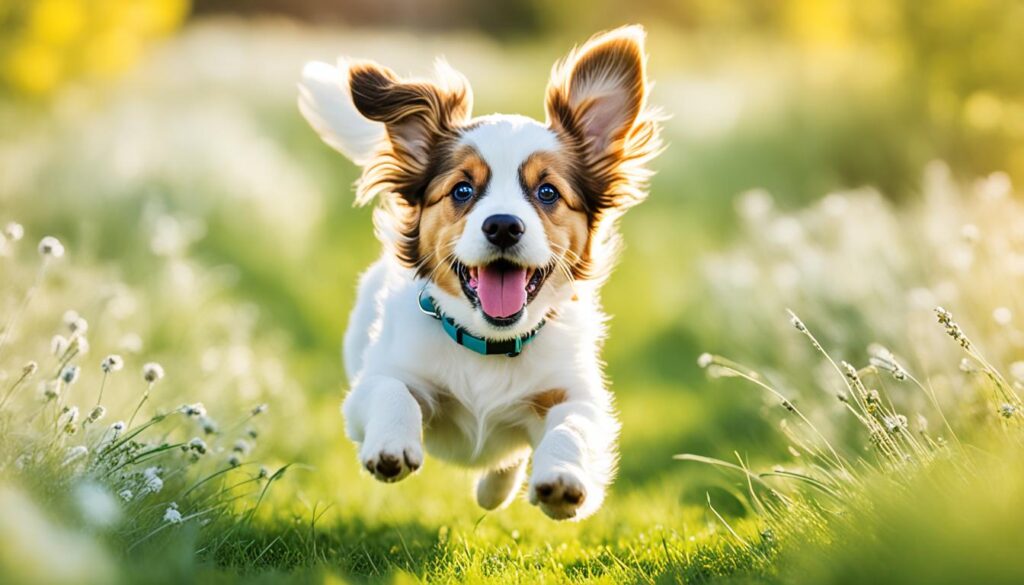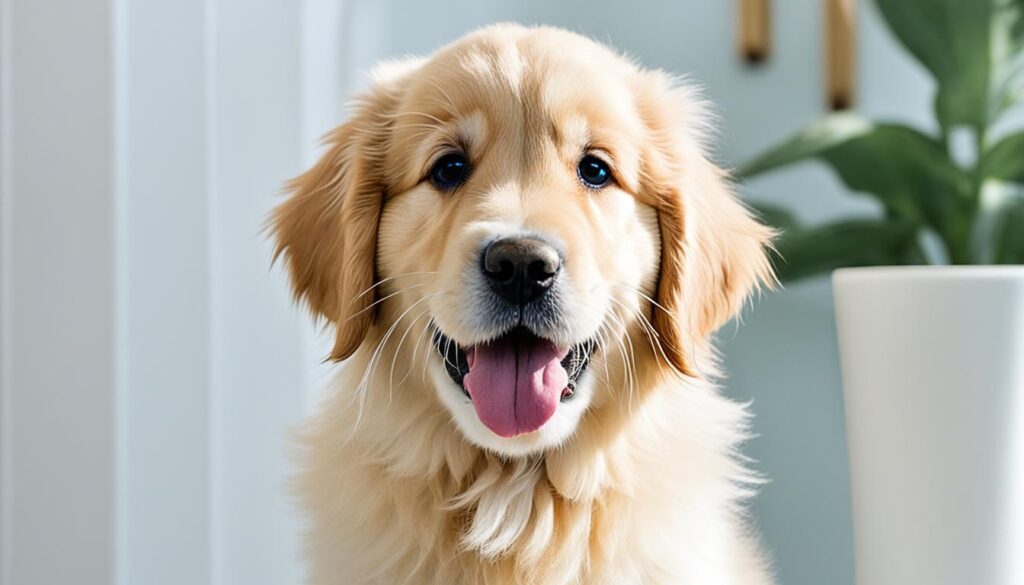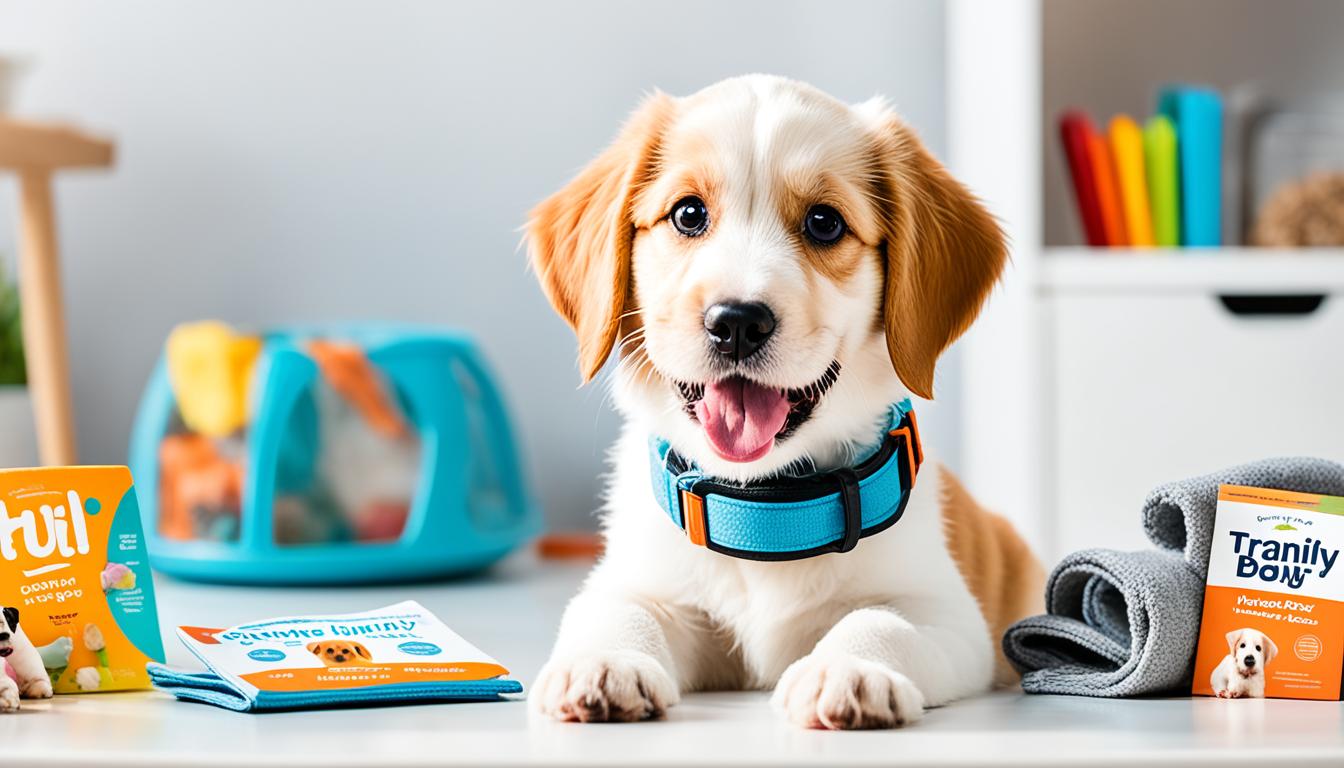Are you ready to embark on the joyful journey of raising a puppy? Before you bring home your adorable four-legged companion, it's important to equip yourself with the knowledge and skills to provide the best care possible. From nutrition and training to health and socialization, there's a lot to learn when it comes to caring for a puppy.
But here's a question to ponder: Do you know the essential puppy care tips that can set your furry friend on the right path to a happy and healthy life?
Don't worry if you're unsure or just want to brush up on your knowledge. In this comprehensive guide, we'll walk you through everything you need to know about puppy care. So, let's dive in and discover how to give your new puppy the love and care they deserve!
Key Takeaways:
- Proper nutrition, training, and socialization are crucial for a puppy's well-being.
- Regular veterinary care and vaccinations are essential to keep your puppy healthy.
- Puppy-proofing your home and providing a safe environment is important for their safety.
- Exercise and grooming play key roles in keeping your puppy happy and looking their best.
- Remember to consult with a veterinarian for personalized advice on your puppy's specific needs.
Puppy Nutrition: Feeding Guide for a Healthy Start
Providing proper nutrition is crucial for your puppy's growth and development. In this section, we will guide you through the basics of puppy feeding, including recommended diets, portion sizes, and feeding schedules.
Feeding your puppy a balanced and nutritious diet is essential for their overall health and well-being. The right food can support their growth, strengthen their immune system, and promote proper development. Here are some key tips to help you navigate the world of puppy nutrition:
1. Choose High-Quality Puppy Food
When selecting a puppy food, opt for high-quality brands that meet the nutritional needs of your specific breed or size. Look for products that are labeled as "complete and balanced" to ensure your puppy gets all the essential nutrients.
2. Follow the Feeding Guidelines
Every puppy is different, so it's important to follow the feeding guidelines provided by the manufacturer. These guidelines will help you determine the appropriate portion sizes based on your puppy's age, weight, and activity level.
3. Establish a Regular Feeding Schedule
Establishing a consistent feeding schedule is important for your puppy's digestive health. Divide their daily food allowance into several meals, depending on their age. Puppies younger than three months may need to be fed more frequently.
4. Gradually Transition to New Food
If you decide to switch your puppy's food, do it gradually to avoid upsetting their stomach. Mix a small amount of the new food with their current food, gradually increasing the proportion over a week or two.
5. Monitor Your Puppy's Weight
Regularly monitor your puppy's weight to ensure they are growing at a healthy rate. Consult with your veterinarian if you have concerns about your puppy's weight or if they are overweight or underweight.
"Feeding your puppy a nutritious diet is the foundation for their overall health and well-being." - Dr. Sarah Thompson, Veterinarian
Remember, each puppy is unique, so it's important to consult with your veterinarian to develop a personalized feeding plan that meets their specific needs. They will consider factors such as breed, size, age, and any dietary restrictions or health conditions your puppy may have.
Next, we'll dive into the important topic of puppy training and how to set the foundation for good behavior. Stay tuned!
Puppy Training: Setting the Foundation for Good Behavior
Building a strong foundation of obedience and good behavior is crucial for your puppy's well-being. By implementing effective training techniques and establishing clear communication with your furry friend, you can ensure they grow into a well-mannered and happy companion.
Puppy training involves teaching your puppy basic commands, encouraging positive behaviors, and correcting undesirable ones. A well-trained puppy is not only more enjoyable to be around but also safer and less likely to engage in destructive or dangerous behaviors.
Effective Training Techniques
When it comes to training your puppy, consistency and positive reinforcement are key. Use clear and simple commands, such as "sit," "stay," and "come," accompanied by rewards like treats or praise. Break down complex tasks into smaller steps and gradually increase the difficulty as your puppy progresses.
Remember, patience is key during puppy training. Each puppy learns at their own pace, so be patient and provide plenty of encouragement and rewards.
Basic Commands for Your Puppy
Teaching your puppy basic commands is essential for their safety and well-being. These commands form the foundation of obedience training and help establish your role as the pack leader. Here are some essential commands to teach your puppy:
- Sit: Train your puppy to sit on command, which is useful for greeting visitors and preventing jumping.
- Stay: Teach your puppy to stay in one place until released, ensuring their safety in different situations.
- Come: Train your puppy to come to you when called, promoting recall and preventing them from wandering off.
- Leave it: Teach your puppy to leave objects alone using this command, preventing them from picking up harmful items.
Consistency and repetition are essential when teaching these commands to your puppy. Practice them in various environments and gradually increase distractions as your puppy becomes more proficient.
Tips for Positive Reinforcement
Positive reinforcement is a powerful tool when training your puppy. By rewarding desired behaviors, you motivate your puppy to repeat those actions in the future. Here are some tips for effective positive reinforcement:
- Use treats: Offer small, tasty treats as rewards for good behavior.
- Use praise: Lavish your puppy with praise, using an enthusiastic tone of voice and petting as positive reinforcement.
- Timing is crucial: Reward your puppy immediately after they exhibit the desired behavior.
- Be consistent: Always reward your puppy for the same behavior to reinforce the connection between the command and the reward.
Positive reinforcement helps create a positive learning experience for your puppy and strengthens the bond between you and your furry friend.
Remember, puppy training requires patience, consistency, and a lot of love. By setting the foundation for good behavior early on, you can raise a well-behaved and happy companion for years to come.
Puppy Health: Keeping Your Furry Friend Happy and Healthy
Ensuring the health and well-being of your puppy is vital for their happiness and longevity. By prioritizing regular veterinary care and preventive measures, you can protect your furry friend from common health issues and provide them with a strong foundation for a healthy life.
Veterinary Care: The Key to Puppy Health
Regular vet check-ups are essential for monitoring your puppy's overall health and catching any potential issues early on. During these visits, your vet will examine your puppy's weight, temperature, heart rate, and general body condition. They will also administer necessary vaccinations and deworming treatments to protect against diseases and parasites.
It is recommended to schedule a wellness exam for your puppy every 2-4 weeks until they are about 16 weeks old. Afterward, annual check-ups should be sufficient to ensure their health and well-being.
Vaccinations: Shielding Your Puppy from Disease
Vaccinations are crucial for protecting your puppy from a variety of potentially life-threatening diseases. By vaccinating your puppy according to the recommended schedule, you can safeguard their health and minimize the risk of infections.
Common vaccinations for puppies include:
- Distemper: Protects against a highly contagious viral disease affecting the respiratory, gastrointestinal, and nervous systems.
- Hepatitis: Guards against hepatitis, a viral infection that impacts the liver.
- Parvovirus: Shields against a severe and often fatal viral disease that affects the intestines.
- Rabies: Provides protection against rabies, a deadly viral infection that affects the nervous system.
Consult with your veterinarian to create a personalized vaccination schedule tailored to your puppy's needs.
Parasite Prevention: Shielding Your Puppy from Infestations
Parasites such as fleas, ticks, and worms can cause significant discomfort and health issues for your puppy. Implementing preventive measures is vital to keep these unwanted visitors at bay.
Here are some common methods of parasite control for puppies:
- Flea and tick treatments: Topical or oral medications that prevent and treat infestations.
- Heartworm prevention: Monthly medications that safeguard against heartworm disease transmitted by infected mosquitoes.
- Deworming: Administering deworming medications to eliminate intestinal parasites like roundworms, hookworms, and tapeworms.
Regularly check your puppy for signs of parasites, such as itching, hair loss, or gastrointestinal issues, and consult with your veterinarian for appropriate preventive and treatment options.
Dental Care: Promoting a Healthy Smile
Just like humans, puppies need proper dental care to maintain good oral health. Neglecting dental hygiene can lead to tooth decay, gum disease, and other dental problems.
To keep your puppy's teeth and gums healthy:
- Brush their teeth regularly with a pet-specific toothbrush and toothpaste.
- Provide them with dental chews or toys designed to promote oral health.
- Consult with your veterinarian for professional dental cleanings if necessary.
Recognizing Signs of Illness: Monitoring Your Puppy's Health
As a responsible pet owner, it is crucial to have a basic understanding of common signs of illness in puppies. By being vigilant and attentive to changes in behavior or physical appearance, you can promptly seek veterinary care if needed.
Some signs of illness in puppies include:
- Loss of appetite or weight
- Excessive lethargy or lack of energy
- Vomiting or diarrhea
- Coughing or sneezing
- Difficulty breathing
- Changes in urination or bowel movements
- Unusual skin or coat conditions
If you notice any of these signs or any other abnormal behavior in your puppy, it is advisable to consult with your veterinarian for a proper diagnosis and treatment.
Remember, your puppy's health is a top priority, and with regular veterinary care, preventive measures, and your love and attention, you can ensure they lead a happy and healthy life.

Puppy Socialization: Building a Confident and Well-Adjusted Companion
Socializing your puppy from an early age is crucial for their overall well-being and behavior. Proper socialization sets the foundation for a confident and well-adjusted companion. By exposing your puppy to various experiences, you can help them develop positive social skills and reduce the chances of behavioral issues down the road.
Introducing your puppy to new environments, people, and other animals is key to promoting positive social interactions. Gradual exposure to different elements will help your puppy feel at ease and build their self-confidence. Here are a few tips to get you started:
- Invite friends and family over to meet your puppy and ensure they have positive interactions with different people.
- Take your puppy on walks in different neighborhoods or parks to expose them to new sights, sounds, and smells.
- Enroll your puppy in puppy socialization classes or group training sessions, where they can interact with other puppies in a controlled environment.
- Arrange playdates with friendly, well-socialized dogs to help your puppy learn appropriate social behaviors and body language.
- Expose your puppy to various stimuli such as different surfaces, objects, and noises to prevent fear or anxiety later in life.
Remember to always create positive experiences during the socialization process. Reward your puppy with treats, praise, and affection for calm and friendly behavior. This will reinforce their confidence and help them associate new experiences with positive outcomes.
"Properly socializing your puppy leads to a confident and well-rounded companion. Investing time in their social development is one of the best gifts you can give them." - Canine Behavior Specialist, Emma Jones
Keep in mind that every puppy is unique, and socialization should be tailored to their individual needs. If your puppy shows signs of fear or discomfort, take a step back and go at a pace that is comfortable for them. Consult with a professional trainer or behaviorist if you need guidance.
By dedicating time and effort to puppy socialization, you are setting your furry friend up for a lifetime of positive interactions and well-adjusted behavior.
Puppy Exercise: Keeping Your Active Pup Fit and Happy
Regular exercise is essential for your puppy's physical and mental health. Just like humans, puppies need physical activity to stay happy and maintain a healthy weight. Exercise not only helps your pup burn off extra energy, but it also promotes muscle development, strengthens the cardiovascular system, and supports overall well-being.
When it comes to puppy exercise, it's important to consider their age, breed, and individual needs. Here are some guidelines to keep in mind:
- Age-appropriate exercises: Different age groups have different exercise requirements. Young puppies have developing bones and joints, so their exercise should be gentle and low-impact. Short walks, controlled playtime, and interactive toys are great options. As your puppy grows, you can gradually increase the intensity and duration of their exercise.
- Playtime: Play is an excellent way to provide exercise and mental stimulation for your pup. Engage in interactive games such as fetch, tug of war, or hide and seek. These activities not only keep your furry friend physically active but also strengthen the bond between you and your puppy.
- Mental stimulation: In addition to physical exercise, mental stimulation is equally important. Puzzle toys, treat-dispensing toys, and obedience training sessions can challenge your pup's mind and prevent boredom, which can lead to destructive behaviors.
- Consistency: Regular exercise should be a part of your daily routine. Set aside dedicated time for your puppy's exercise and stick to it. Consistency helps your pup develop healthy habits and ensures they get the physical and mental stimulation they need.
Remember, every puppy is unique, and their exercise needs may vary. Observe your puppy's behavior and energy levels to determine the right amount of exercise for them. Consulting with your veterinarian can also provide valuable insights based on your puppy's breed, health condition, and individual characteristics.
Keep in mind that while exercise is important, it's equally crucial to avoid overexertion. Puppies need time to rest and recover. Provide a comfortable space for them to relax after exercise, ensuring they have access to fresh water to stay hydrated.
"A tired puppy is a happy puppy!"
Regular exercise not only keeps your puppy physically fit but also contributes to their overall happiness and well-being. By following these guidelines and providing age-appropriate exercises, playtime, and mental stimulation, you can ensure your active pup stays fit and happy.
Puppy Grooming: Maintaining a Clean and Well-Groomed Coat
Proper grooming practices are essential for maintaining your puppy's hygiene and appearance. Regular grooming sessions not only help keep your puppy clean but also provide an opportunity for bonding and monitoring their overall health. To keep your puppy looking and feeling their best, here are some helpful grooming tips:
Bathing
Bathing your puppy is important for maintaining a clean and fresh-smelling coat. However, be cautious not to overdo it, as excessive bathing can strip their coat of essential oils. Aim for bathing your puppy once every 4-6 weeks, or as needed. Use a gentle shampoo specifically formulated for puppies and lukewarm water. Be sure to rinse thoroughly to remove all soap residue.
Brushing
Regular brushing helps remove loose hair, prevents matting, and promotes healthy skin and coat. Invest in a soft-bristled brush or a grooming tool suitable for your puppy's coat type. Brush in the direction of hair growth, using gentle strokes to avoid causing discomfort. Start slow and gradually increase the duration of brushing sessions as your puppy becomes more comfortable.
Nail Trimming
Keeping your puppy's nails trimmed is essential for their comfort and to prevent overgrowth, which can lead to discomfort and difficulty walking. Use a specially designed nail clipper for dogs, and only trim the tip of the nail, avoiding the quick (the sensitive part that contains blood vessels). If you're unsure or uneasy about trimming your puppy's nails, consult a professional groomer or your veterinarian.
Ear Cleaning
Regular ear cleaning is important for preventing ear infections and maintaining your puppy's ear health. Use a damp cotton ball or a recommended ear cleaning solution to gently wipe the outer part of your puppy's ears. Be cautious not to insert anything into the ear canal, as it can cause damage. If you notice any signs of infection, such as redness, swelling, or discharge, consult your veterinarian for proper treatment.
"Regular grooming sessions not only help keep your puppy clean but also provide an opportunity for bonding and monitoring their overall health."
Remember, each puppy is unique, and their grooming needs may vary depending on their breed, coat type, and individual preferences. If you're unsure about any aspect of grooming or need personalized advice, consult a professional groomer or your veterinarian. By maintaining a regular grooming routine, you'll help keep your puppy's coat clean, healthy, and looking its best.
Now that you're equipped with valuable puppy grooming tips, let's move on to the next section, where we will explore the importance of puppy vaccinations in protecting against common diseases.

Puppy Vaccinations: Protecting Against Common Diseases
Vaccinations are a crucial aspect of caring for your puppy, as they play a vital role in protecting your furry friend from common and potentially serious diseases. By following the recommended vaccination schedule and ensuring your puppy stays up to date with their shots, you can provide them with the best defense against these illnesses.
There are different types of vaccinations that your puppy will need to receive to maintain their health and well-being. These vaccines are specifically designed to protect against diseases such as distemper, parvovirus, rabies, and more. Each vaccine targets a specific infection or virus, providing your puppy with immunity to these pathogens.
The Importance of Puppy Vaccinations
Getting your puppy vaccinated is not only essential for their individual health but also contributes to the overall prevention of infectious diseases within the canine population. Vaccinations help create herd immunity, reducing the likelihood of outbreaks and protecting vulnerable puppies who may not yet be vaccinated.
Puppy vaccinations are like a superpower shield that can safeguard your furry friend from life-threatening diseases. By ensuring their immunizations are up to date, you are keeping them safe and giving them the best chance for a healthy and happy life.
The puppy vaccination schedule is carefully designed to introduce immunity at the right time, when your puppy's immune system is ready to respond effectively. It typically starts at around 6 to 8 weeks old, with booster shots given at regular intervals until they reach adulthood.
Recommended Puppy Vaccination Schedule
While each veterinarian may have slight variations in their vaccination protocols, the following is a general outline of the recommended puppy vaccination schedule:
| Vaccine | Age | Frequency |
|---|---|---|
| Distemper, Hepatitis, Parvovirus, Parainfluenza (DHPP) | 6-8 weeks | Initial vaccination, 2-4 weeks apart |
| Coronavirus | 6-8 weeks | Initial vaccination, 2-4 weeks apart |
| Leptospirosis | 10-12 weeks | 2-4 weeks after initial vaccination |
| Rabies | 12-16 weeks | Single dose, can vary depending on local regulations |
This schedule is a general guideline, and it's important to consult with your veterinarian to determine the best vaccination protocol for your specific puppy's needs.
Remember, vaccinations need to be kept up to date throughout your puppy's life to ensure they remain protected. Regular visits to your veterinarian will help you stay on track with their vaccination schedule and discuss any additional vaccines that may be recommended based on your puppy's lifestyle and risk factors.
Puppy Safety: Creating a Safe Environment for Your Furry Friend
When bringing a new puppy into your home, their safety should be a top priority. By creating a safe environment, you can minimize potential hazards and ensure your furry friend's well-being.
Puppy-Proofing Your Home
Puppy-proofing your home is essential to protect your curious little one from harm. Consider the following tips:
- Secure loose cords and wires to prevent chewing or tripping hazards.
- Lock away toxic substances such as cleaning supplies, medications, and plants that may be harmful to your puppy if ingested.
- Keep small objects, such as toys or household items, out of your puppy's reach to prevent choking hazards.
- Block off areas that could be dangerous, such as staircases or balconies.
- Close off spaces behind furniture or appliances where your puppy could become trapped.
Remember, puppies are naturally curious and may explore their surroundings by chewing or ingesting objects. By keeping a watchful eye and implementing these puppy-proofing measures, you can minimize the risk of accidents.
Identifying Potential Hazards
Being aware of potential hazards in your home is crucial to ensuring your puppy's safety. Consider the following:
- Secure windows and balcony doors to prevent your puppy from accidentally falling.
- Keep electrical cords out of your puppy's reach to prevent chewing and potential electrical shock.
- Avoid leaving harmful substances, such as cleaning products or pesticides, accessible to your puppy.
- Store small objects, such as coins or buttons, in a secure container to prevent choking hazards.
By being proactive and addressing potential hazards, you can create a safer environment for your puppy to explore and play in.
Creating a Safe Space
Providing your puppy with a designated safe space can help them feel secure and reduce anxiety. Consider the following:
- Create a comfortable crate or bed area where your puppy can retreat to when they need some downtime.
- Ensure the space is cozy and quiet, away from high traffic areas or loud noises.
- Place familiar toys and blankets in the safe space to provide a sense of familiarity and comfort.
Having a dedicated safe space allows your puppy to relax and recharge, contributing to their overall well-being.
Remember, each puppy is unique, so it's essential to assess your specific home environment and adapt these safety measures accordingly.
Common Household Hazards
| Hazard | Prevention Tips |
|---|---|
| Chemicals (cleaning supplies, pesticides) | Store these items out of your puppy's reach or in locked cabinets. |
| Toxic plants | Remove toxic plants from your home or place them in areas inaccessible to your puppy. |
| Electrical cords | Keep electrical cords hidden or use cord protectors to prevent chewing. |
| Sharp objects | Store sharp objects (knives, scissors) securely, out of your puppy's reach. |
| Small objects | Remove small objects that can be swallowed or pose a choking hazard. |
Always remember to supervise your puppy when they are exploring new areas and gradually introduce them to different parts of your home as they grow and become more familiar with their surroundings.
By implementing these safety measures, you can create a secure environment for your furry friend to thrive and enjoy their new home.
Conclusion
In conclusion, by following these essential puppy care tips, you can provide your new furry friend with the best possible start in life. From nutrition and training to health and socialization, taking care of a puppy requires dedication and love. Remember to consult with your veterinarian for personalized advice and enjoy the journey of watching your puppy grow into a happy and healthy companion.

